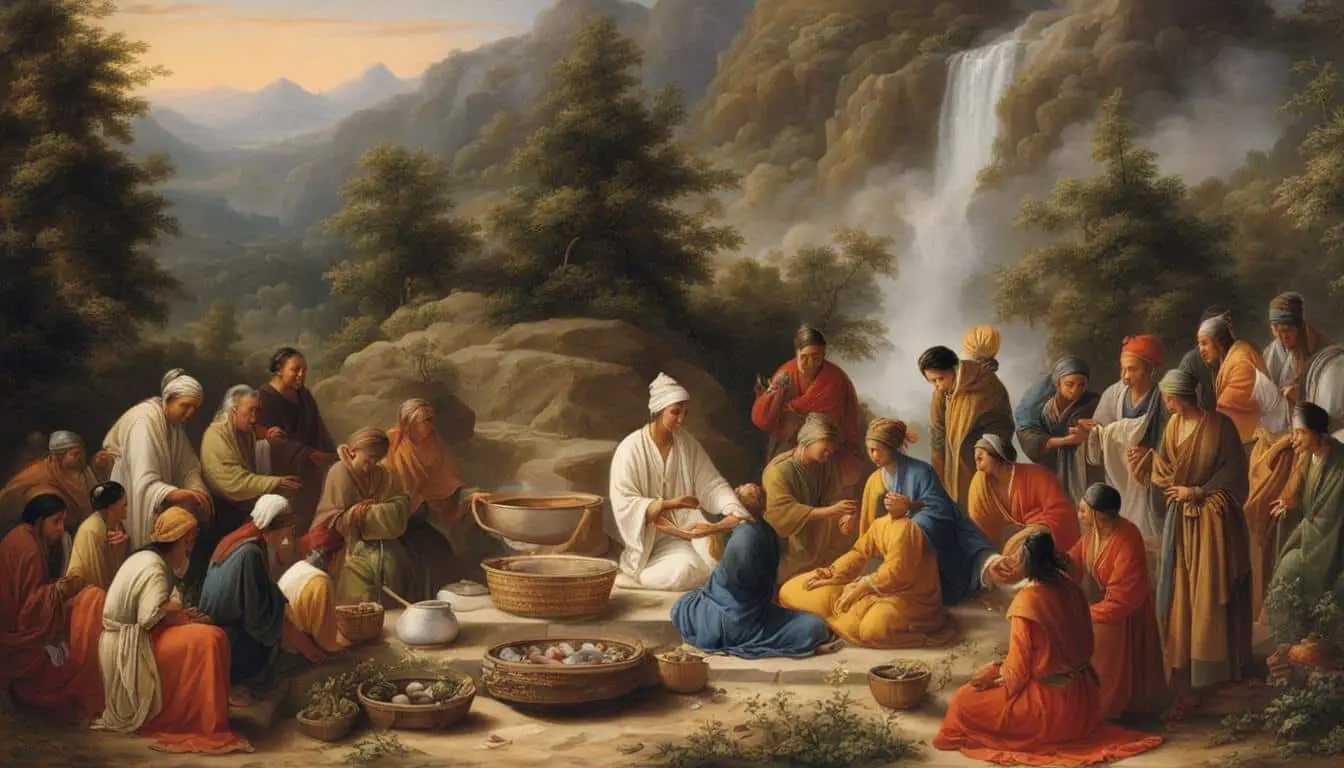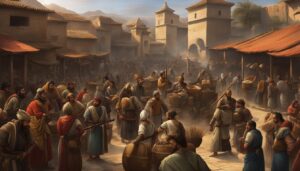
In ancient times, people faced various risks to their health, including war, disease, famine, and childbirth, resulting in a significantly lower average lifespan compared to modern times. However, ancient cultures had their own approaches to combating disease and injury.
The Greek god Asklepios was dedicated to healing and had sanctuaries called Asklepions where the ill and injured sought relief. Ancient physicians, like Hippocrates, knew about wound care and the healing properties of certain herbs. Surgical techniques, such as cataract surgeries, were also advanced for their time. Islamic scholars further studied Greek medicine and created their own medical texts. Ancient civilizations, such as those in the Near East, practiced trephination and had advanced dental practices. Overall, ancient scripture provides insights into the medical knowledge and practices of ancient civilizations.
Key Takeaways
- Ancient cultures had their own approaches to combating disease and injury.
- The Greek god Asklepios was dedicated to healing and had sanctuaries called Asklepions.
- Ancient physicians, like Hippocrates, knew about wound care and the healing properties of certain herbs.
- Ancient civilizations, such as those in the Near East, practiced trephination and had advanced dental practices.
- Ancient scripture provides valuable insights into the medical knowledge and practices of ancient civilizations.
The Role of Healing in Ancient Scripture
In many ancient societies, healing was not just a physical process but also a spiritual one. Ancient texts provide insights into the holistic approach to healthcare in ancient cultures. The role of the gods in human health was significant. For instance, in the Greek world, the god Asklepios was exclusively dedicated to healing, and people would seek his divine intervention in times of illness and injury.

Healing sanctuaries called Asklepions were established to cater to the needs of the sick and injured. These sacred spaces provided more than just medical treatment; they offered a holistic healing experience. At Asklepions, individuals would partake in healing baths, consume healthy foods, and find solace in sanctuary rooms for rest and meditation. Animal sacrifices and votive offerings were also made to honor Asklepios and seek his favor.
“Medicine is of all the arts the most noble; but often the presence of the doctor keeps out the presence of the God, who heals and preserves; wherefore, the doctor must be at times acquitted of the suspicion of being the cause of the disease” – Plato
Ancient texts, including those authored by renowned physicians like Hippocrates, provided medical knowledge that influenced healthcare practices for centuries to come. These texts were not just about physical treatments but also emphasized the importance of a patient’s mental and emotional well-being. Ancient healers understood that healing was a multifaceted process that required addressing the spiritual, emotional, and physical aspects of an individual.
The Divine Patrons of Healing
Ancient physicians and healers were revered as divine patrons of the medical profession. They were seen as intermediaries between the gods and humans, channeling the divine healing power to alleviate suffering. Hippocrates, often referred to as the “Father of Medicine,” became known as a divine figure in the medical community. His teachings and principles were considered sacred, and his oath, the Hippocratic Oath, continues to be a guiding ethical code for physicians today.
The belief in the spiritual aspects of healing persisted across many ancient cultures. The integration of spirituality into healthcare practices reflected the understanding that true healing encompassed more than just the physical body. It involved nurturing the spirit and finding harmony between the mind, body, and soul.
References
- Carlson, E. (2004). Healing gods: Complementary and alternative medicine in christian America. Journal of Contemporary Religion, 19(3), 339-340.
- Dunn, C. (2010). Healing in the Bible: Theological Insight for Christian Ministry. Baker Academic.
- Koenig, H. G. (2001). Spirituality and medicine: A randomized trial of physician-patient communication. South Med J, 94(6), 1-6.
In the next section, we will explore the use of medicinal plants and remedies in ancient scripture.
Medicinal Plants and Remedies in Ancient Scripture
The Bible provides valuable insights into the ancient understanding and utilization of medicinal plants and remedies. While there was no organized medical system in ancient Israel and Judah, the scriptures mention various plants and substances for their potential healing properties. One such example is the use of figs as poultices for treating boils, highlighting the ancient belief in their medicinal efficacy.
Ancient texts also mention the use of mandrake, a plant believed to possess fertility-enhancing properties. Additionally, ointments, bandages, and prayers were employed as part of the healing process, emphasizing the holistic approach to wellness during those times. It is important to understand that the lines between medicine, religion, and magic were often blurred in ancient cultures, and remedies were intertwined with spiritual beliefs.
While no comprehensive catalog of ancient medicinal plants exists in the scriptures, Egyptian and Mesopotamian records provide additional insights into the flora of the region. By drawing upon modern interpretations and ethnobotanical studies, researchers have been able to identify potential medicinal plants mentioned in ancient texts.
Ancient scripture not only reveals the rich wisdom of early medical practices but also offers a glimpse into the worldview and cultural context in which these practices were embedded. Exploring the ancient healing techniques and wisdom preserved in these texts allows us to appreciate the historical evolution of healthcare and the diverse approaches to wellness throughout human history.
FAQ
What are some examples of ancient medical practices?
Ancient cultures had their own approaches to combating disease and injury. The Greek god Asklepios was dedicated to healing and had sanctuaries called Asklepions where the ill and injured sought relief. Ancient physicians, like Hippocrates, knew about wound care and the healing properties of certain herbs. Surgical techniques, such as cataract surgeries, were also advanced for their time. Islamic scholars further studied Greek medicine and created their own medical texts. Ancient civilizations, such as those in the Near East, practiced trephination and had advanced dental practices.
How did ancient societies view the role of gods in health?
In many ancient societies, the gods played a significant role in human health. For example, in the Greek world, the god Asklepios was exclusively dedicated to healing. People would travel to sanctuaries called Asklepions, which provided baths, healthy foods, and sanctuary rooms for rest and meditation. Animal sacrifices and votive offerings were also made at the temples of Asklepios. Ancient physicians and healers were intrinsically linked to divine healing, with famous physicians like Hippocrates becoming known as the divine patrons of the medical profession. Ancient texts, including those authored by Hippocrates, provided medical knowledge that influenced medical practices for centuries to come.
What insights can be gained from ancient scripture about medicinal plants and remedies?
The Bible provides glimpses into the use of medicinal plants and remedies in ancient times. While no organized medical system existed in ancient Israel and Judah, various plants were mentioned for their potential medicinal uses. For example, figs were used as poultices for boils, and mandrake was believed to possess fertility-enhancing properties. Biblical texts also mention the use of ointments, bandages, and prayers for healing. Additionally, Egyptian and Mesopotamian records contain information on medicinal plants that were likely known and used in the Holy Land. Modern interpretations and ethnobotanical studies have helped identify potential medicinal plants mentioned in biblical texts. It is important to note that the distinction between medicine, religion, and magic was not as clear in ancient times, and remedies often relied on the belief in their efficacy.








